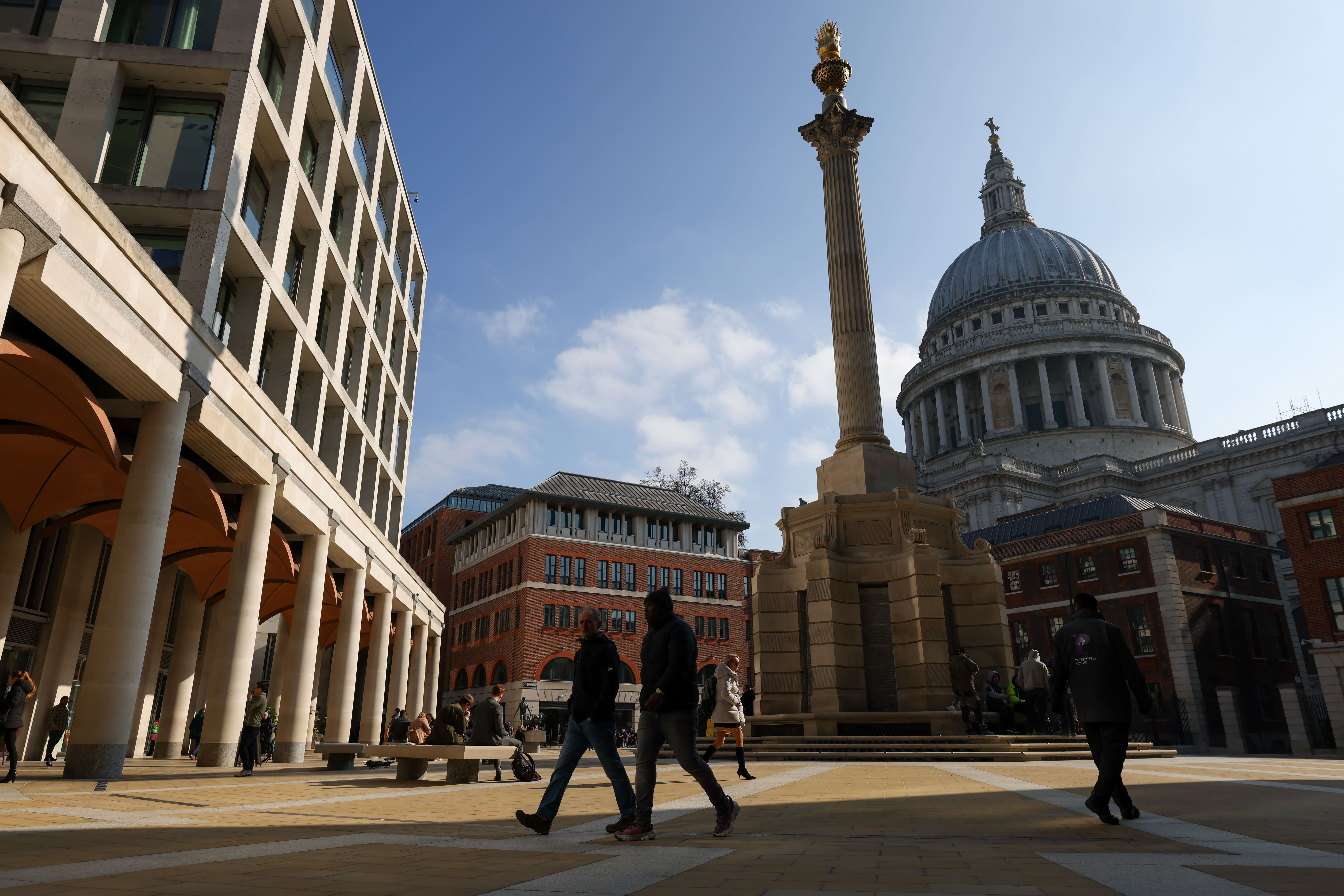- The consumer price index rose at an annual rate of 10.1%, according to the Office for National Statistics, above a consensus forecast of 9.8% in a Reuters poll of economists.
- This follows an unexpected jump to 10.4% in February, which broke three straight months of declines since October’s 41-year high of 11.1%.
City workers at Paternoster Square, where the headquarters of the London Stock Exchange is located, in the City of London, UK, on Thursday, March 2, 2023.
bloomberg | bloomberg | Getty Images
UK inflation unexpectedly remained in double digits in March as households continued to grapple with high food and energy bills.
The consumer price index rose at an annual rate of 10.1%, according to the Office for National Statistics, above a consensus forecast of 9.8% in a Reuters poll of economists.
This is down slightly from the unexpected jump to 10.4% in February, which broke three straight months of declines since October’s 41-year high of 11.1%.
On a monthly basis, CPI inflation was 0.8%, above the Reuters consensus of 0.5% and down from 1.1% in February.
The consumer price index including housing costs for landlords (CPIH) rose 8.9% in the twelve months through March 2023, down slightly from 9.2% in February but well above expectations.
Core CPI, which excludes volatile food, energy, alcohol and tobacco prices, rose 5.7% over the 12-month period, unchanged from February’s annual rise – which will be a concern for the Bank of England.
“The largest contributions to the annual inflation rate increase in the consumer price index in March 2023 came from housing and household services (primarily from electricity, gas and other fuels), and food and non-alcoholic beverages,” the Office for National Statistics said in a report Wednesday.
With British households still grappling with soaring food and energy bills, workers in a range of sectors have launched mass strikes in recent months amid disagreements over pay and terms.
The Office for National Statistics said prices of food and non-alcoholic drinks rose 19.2% in the year to March 2023, the biggest annual increase in more than 45 years.
Britain’s finance minister, Jeremy Hunt, said Wednesday’s figures reaffirm why the government must continue its efforts to bring down inflation.
“We are on track to do this – with the OBR (Office for Budget Responsibility) predicting we will cut inflation in half this year – and we will continue to support people with an average cost of living subsidy of £3,300 per household over this year and last funded by unexpected taxes on Energy earnings.
The difficult task of the Bank of England
The Bank of England last month raised interest rates by 25 basis points to 4.25%, and traders expect a 72% chance of another quarter-point increase at the May 11 MPC meeting.
Economists expect that a small drop in the headline figure for March will be followed by a larger drop in April, due to the underlying effects of higher energy prices in April 2022, when the UK energy regulator raised its price cap by 54%.
“While core inflation is likely to be more stubborn, pressure on consumer demand from tax increases and the delayed impact of rate hikes should put it on track for a solid downward path by fall,” said Suren Theroux, director of economics at ICAEW. (Institute of Chartered Accountants in England and Wales).
The UK economy was flat in February as widespread industrial activity and an ongoing cost of living crisis dampened activity, and Theroux suggested the MPC may be more divided on whether to raise interest rates further in May, as “concerns about a stable economy grow”. .”
Hugh Gember, global market analyst at JPMorgan Asset Management, said that although headline inflation is once again headed in the right direction, the central bank is “still far from comfort that price pressures are under control.”
“Yesterday’s labor market data provided stark evidence of how tight job markets are fueling strong wage growth. Today’s inflation data feed was clear, given strength in wage-sensitive service sectors,” Jemper said.
unemployment in the United Kingdom increased by up to 3.8% In the three months ending at the end of February, new data showed on Tuesday, while levels of economic inactivity fell and employment rates also rose more than expected.
Victoria Clarke, chief UK economist at Santander CIB, said: “For the Bank of England, although there have been hints of weakness in the labor market tightness, particularly as job vacancies continue to fall, the job market remains tight overall. “.
“The latest report does not provide reassurance that the MPC is likely to find that wage growth is easing towards rates consistent with the BoE’s inflation target.”
While stabilizing energy prices will help rein in inflation during the second half of the year, JPMorgan’s Jemper said it is “increasingly clear” that a prolonged period of stagnant economic growth will be necessary to curb underlying price pressures.
“Another 25 basis point rate hike appears very likely in May, and the Bank should be prepared to take further action unless economic data shows more specific signs of slowing,” he said.
“Policy makers have come a long way in their fight against inflation. Going forward, the biggest mistake would be to prematurely claim victory.”

“Amateur organizer. Wannabe beer evangelist. General web fan. Certified internet ninja. Avid reader.”



/cdn.vox-cdn.com/uploads/chorus_asset/file/24043392/chromecast.jpg)



More Stories
Technology stocks smoked, with Nvidia stock falling 10% to mark its worst week of the year
Procter & Gamble (PG) Q3 2024 earnings
Netflix: Profits rise after password sharing campaign